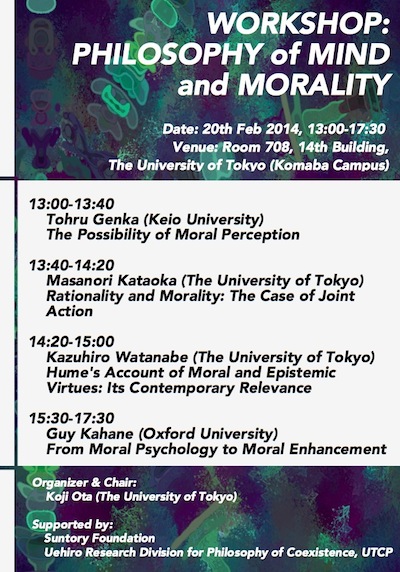
|
Title: | Workshop: Philosophy of Mind and MoralityFinished |
||
|---|---|---|---|---|
| Date: | 13:00-17:30, Thursday, February 20, 2014 |
Place: | Room 708, Building 14, University of Tokyo, Komaba |
|
Workshop: Philosophy of Mind and Morality
Program:
13:00-13:40
Tohru Genka (Keio University)
The Possibility of Moral Perception
I defend the perceptual view on moral properties, which claims that some moral properties can be objects of perception. First, I characterize "perception" by using widely accepted account on perceptual experience, i.e. the representational view. Next, I motivate the perceptual view by highlighting the similarities between perception of basic sensible properties (color, shape, sounds, etc.) and some moral experiences. Then, I suggest a way to deal with the relativity of morality within the perceptual view by focusing on "cognitive penetrability" of perception: perceptual experience can vary due to the differences in other cognitive states while the perceived object does not change.
13:40-14:20
Masanori Kataoka (The University of Tokyo)
Rationality and Morality: The Case of Joint Action
Reason has often been supposed to be the source of morality. However, this sort of rationalistic view has always been disputed. In this talk, I try to defend a local rationalist perspective of morality focusing on "joint action" (i. e. "doing something together"). Joint action seems to inherently involve a cooperative norm, "help each other in the course of the action", which is seemingly a moral norm. I shall argue that the occurrence of this cooperative norm is properly explained by appealing to our rationality, and examine what psychological implications this rationalist claim has by reviewing some experimental findings.
14:20-15:00
Kazuhiro Watanabe (The University of Tokyo)
Hume's Account of Moral and Epistemic Virtues: Its Contemporary Relevance
Despite the remarkable expansion of studies of virtue ethics and virtue epistemology over a few decades, some questions central to these fields are still left open. In particular, it is not very clear whether (or how) we can (or should) draw a distinction between moral and epistemic, or intellectual, virtues. In contemporary contexts, this question traces its roots to Anscombe’s 1958 article ‘Modern Moral Philosophy’ that served as the catalyst for the rediscovery of Aristotelian virtue ethics today. Her critical scrutiny aims at, among other modern moral philosophers, David Hume. However, recent years have witnessed lively attempts to interpret Hume as a virtue ethicist and as a virtue epistemologist, which invites us to a reassessment of the issue. In this talk, I explore Hume’s account of moral and epistemic virtues, particularly in connection with the said question, and discuss what contemporary virtue theorists can learn from it.
15:30-17:30
Guy Kahane (Oxford University)
From Moral Psychology to Moral Enhancement*
Most of the philosophical interest in recent scientific work on moral psychology has focused on whether it is possible to draw normative conclusions from that empirical research. However moral psychology may matter to ethics in a more dramatic way. Over the past decade, there has been much debate about the prospects and risks of human enhancement—using advances in neuroscience to enhance human capacities and well-being. In this talk, I shall consider whether such advances might also make it possible for us to enhance our moral capacities.
(*This is also one of Guy Kahane’s series of lectures supported by UTCP)
Organizer & Chair:
Koji Ota (The University of Tokyo)
Language: English | Admission Free | No Registration Required

Supported by: Suntory Foundation and Uehiro Research Division for Philosophy of Coexistence, UTCP






